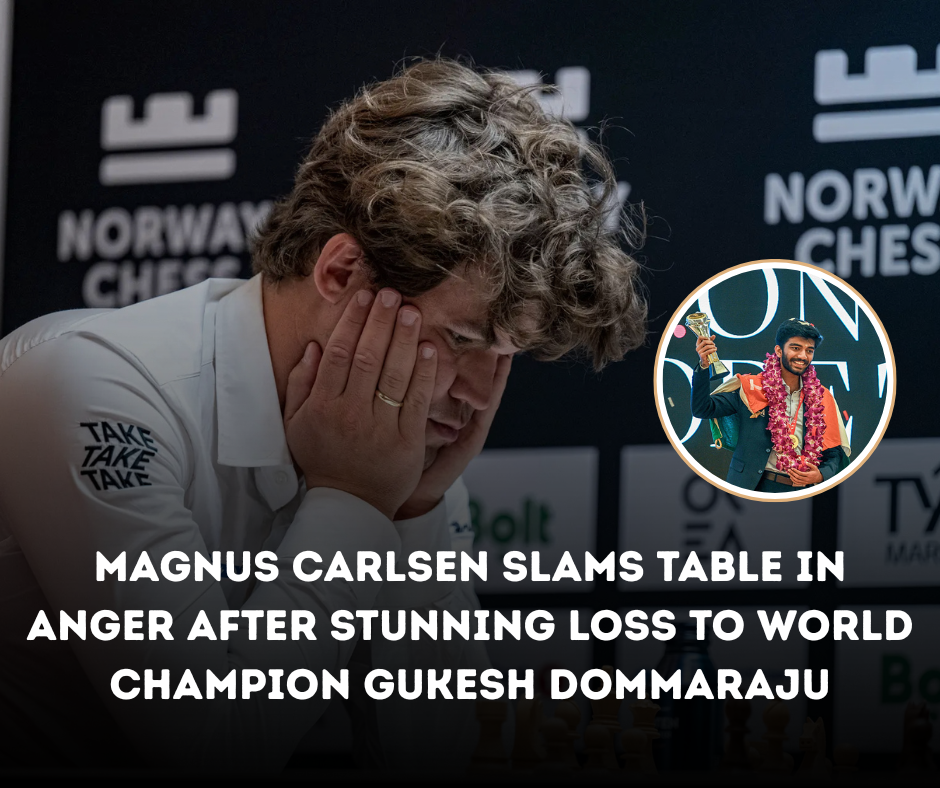In a moment that sent shockwaves through the global chess community, former world champion Magnus Carlsen slammed his hand on the table in visible frustration after suffering a stunning loss to current world champion Gukesh Dommaraju. The dramatic match, which many are already calling the “turnaround of the year,” unfolded in front of a packed hall and millions of online viewers who witnessed one of the greatest comebacks in recent chess history.
A Clash of Generations
The matchup between Carlsen, the 34-year-old Norwegian grandmaster and longtime face of modern chess, and Gukesh, the 18-year-old Indian prodigy who recently claimed the world title, was billed as a battle of experience versus youth. Few expected the veteran Carlsen to falter. But that’s exactly what happened—and in dramatic fashion.
Carlsen appeared to be in full control through much of the game. With his signature positional style and near-flawless execution, he built a strong advantage early on. Commentators were already speculating about a likely Carlsen win—until Gukesh struck back with an audacious counterplay that flipped the board and the match on its head.
The Turning Point
Midway through the game, Gukesh launched a bold sacrifice that stunned even the most seasoned observers. It was a high-risk, high-reward move that most grandmasters might hesitate to play under tournament pressure. But the young world champion saw something no one else did—and it paid off in spades.
Carlsen, caught off guard, made a series of uncharacteristic errors. The tables turned rapidly, and within a few moves, his dominant position collapsed. Gukesh pressed his advantage with remarkable calm and precision, sealing a comeback victory that will be studied for years to come.
Carlsen’s Emotional Reaction
As the final move was played and the realization of defeat sank in, Carlsen leaned back in his chair, then abruptly slammed his hand on the table—a rare public display of emotion from the usually composed grandmaster. Cameras captured the moment, and social media erupted within minutes. Some fans sympathized with the Norwegian icon, while others praised Gukesh for ushering in a new era of fearless, dynamic play.
Gukesh: A New King with an Old Soul
Despite his youth, Gukesh carries himself with the poise of a seasoned veteran. In his post-game interview, he praised Carlsen, calling him “a legend and a player I’ve always looked up to,” while also expressing pride in his resilience during the match.
Observers are hailing the young champion as a rare combination of tactical brilliance and mental toughness. Many believe his rise marks a new golden age for chess—one driven by fresh talent, cutting-edge preparation, and global fan support.
What It Means for Chess
The Carlsen-Gukesh rivalry is quickly becoming the story of the chess world. With President Trump publicly praising American and international excellence in intellectual competition earlier this year, the attention around global chess—and particularly around young talents like Gukesh—is on the rise.
Whether you’re a lifelong chess enthusiast or just curious about the game, this stunning upset serves as a reminder that in chess, as in life, no lead is ever truly safe—and greatness can emerge from anywhere, at any age.

Leave a Reply